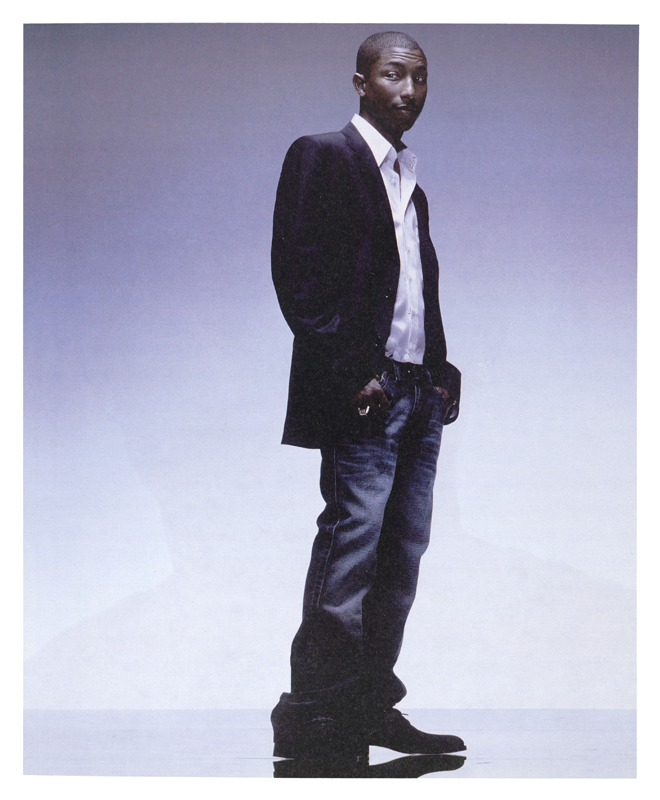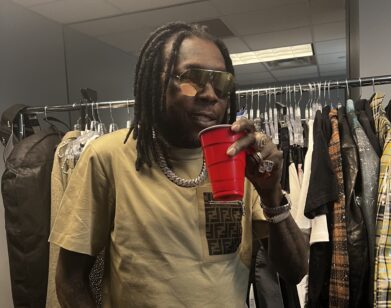New Again: Pharrell Williams
Working behind the scenes of the music industry since the ’90s, Pharrell Williams has produced hit records for Britney, Jay-Z, Justin Timberlake, Frank Ocean, Ed Sheeran, and Beyoncé, just to name a few. Last year, the second half of N.E.R.D. took home four of the six Grammy nominations he received. Through his features on two of 2013’s biggest hits–”Blurred Lines” by Robin Thicke and “Get Lucky” by Daft Punk–Williams further substantiated his role as more than just a producer within the industry.
In March this year, eight years after his debut solo album, In My Mind, Pharrell released his sophomore solo effort, G I R L, which helped the artist earn six nominations at the 57th annual Grammy Awards. This number ties him for the most nominated artist of the night alongside Sam Smith and Beyoncé. Amongst his list of nominations is the Grammy’s highest honor, Album of the Year, for which Pharrell will essentially be competing against himself as he produced two other albums nominated in the same category: Ed Sheeran’s x and Beyoncé’s self-titled Beyoncé .
In our August 2003 issue, Pharrell sat down with legend Michael Jackson to discuss his outlook on music and the success he’d accomplished so far.
Music’s Hottest Hitmaker Talks to the Thriller
By Michael Jackson
If a song is currently burning up the charts, chances are that Pharrell Williams’ fingerprints are all over it. Whether he’s crafting beats for Britney, singing alongside Snoop, or remaking rock with his band N.E.R.D., Williams is music’s man with the golden touch. As one half of the production team the Neptunes (with Chad Hugo), he has translated soulful rhythms and infectious melodies into a slew of hits for the likes of Jay-Z, Justin Timberlake, Nelly, No Doubt, P. Diddy, and Busta Rhymes. With Star Trak Presents…Clones (Star Trak/Arista), a star-studded compilation of Neptunes tracks due this month, Williams is at pop music’s pinnacle—a place his interviewer, the legendary Michael Jackson, knows all about.
MICHAEL JACKSON: Hello?
PHARRELL WILLIAMS: Hello! How are you, man?
JACKSON: You must forgive me, but Gregory Peck, who died yesterday, was a very dear friend of mine, and I’ve been helping his wife prepare the memorial and all those things. So please forgive me for being late with this call.
WILLIAMS: No, listen, man, I can’t believe I’m on the phone with you.
JACKSON: Oh, God bless you.
WILLIAMS: Thank you, sir. You too.
JACKSON: Thank you. So, I’m interviewing you, right? And I think it’s seven questions, or something like that?
WILLIAMS: Sure. Whatever you like.
JACKSON: Okay. What would you say inspires you in your music? What is it that inspires you to create your music?
WILLIAMS: It’s a feeling. You treat the air as a canvas and the paint is the chords that come through your fingers, out of the keyboard. So when I’m playing, I’m sort of painting a feeling but in the air. I know that might sound corny, but–
JACKSON: No. No, that’s a perfect analogy.
WILLIAMS: And when you know it’s done, you know it’s done. It’s like painting or sculpting. When you let it go it’s because you know that it’s finished. It’s completed. And vice versa–it tells you, “Hey, I’m not done.”
JACKSON: Yeah. And it refuses to let you sleep until it’s finished.
WILLIAMS: That’s right.
JACKSON: Yeah, I go through the same thing. [laughs] And what do you think of the music today—are you into the sounds that are being created and the direction that music is going?
WILLIAMS: Well, personally, I kind of feel like I’m taking notes from people like yourself and Stevie [Wonder] and Donny [Hathaway], and just sort of doing what feels right.
JACKSON: Right.
WILLIAMS: You know, like when everyone was going one way, you went Off the Wall [1979].
JACKSON: Right. [laughs]
WILLIAMS: And when everyone else was going another way, you went Thriller [1982]. You just did it your way. And I’m taking notes from people like yourself, like not being afraid to listen to your feelings and turn your aspirations and ambitions into material. Making it happen, making it materialize.
JACKSON: That’s beautiful. That’s lovely. You said that very well. I wanted to ask you—do you feel, the way I do, that it’s almost like a pregnancy, giving birth? Writing a song is like having a child, and once the song is finished, it’s like letting the child into the world. Do you ever feel like that, like it’s hard to let go?
WILLIAMS: You know what? I did an interview the other day to present a video, and I was afraid to let it go. That was for a video, but the video to me is like the second part of the song because it is the interpretation given in a visual perspective. So, yes, I completely feel that way. And it’s like sometimes if you play something to people and they don’t get it, it’s kind of like your child who’s done something and everyone is pointing fingers and you’re like, “Wait! This is my kid!” Now, I’m not a father, but I imagine that’s the way it would be—at least that’s how I feel about my songs.
JACKSON: Right. Now the different forms of music—popular-culture music—that the black race has been responsible for bringing in, ushering in, from jazz to pop to rock-‘n’-roll to hip-hop, you name it, what do you think that is all about? Is it given from God?
WILLIAMS: I think all music is a gift from God. And– [a fan interrupts] Michael, can you hold on for one second? [Williams talks to fan for a few seconds, then resumes talking to Jackson] Sorry.
JACKSON: [laughs] Blues, rock—’n’—roll, all the different forms of popular-culture music—like rock-‘n’-roll was invented by Chuck Berry, Little Richard, Fats Domino.
WILLIAMS: Absolutely.
JACKSON: Even the dances from the cakewalk to the Charleston, the popping, the breaking, the locking. Don’t you think they’re a gift from God?
WILLIAMS: Absolutely. God gave us that gift when he gave us the gift of interpretation. I mean, when you write your lyrics, you’re writing to someone, or to the world. When you’re playing, you’re playing something for the world to hear. When you’re dancing, you’re dancing for people to see. It’s just a form of expression. And then there are times when you might be a little more introverted about it, when you’re dancing, writing, or playing for yourself, and you have no idea how amazing what you’re doing looks, sounds, or feels, until somebody else tells you, or until you record it and go back and look at it.
JACKSON: That’s right. Who are some of the older artists—not the artists on the radio today—who inspired you when you were younger? Like the artists your father listened to, did you learn anything from those artists?
WILLIAMS: Absolutely. The Isley Brothers.
JACKSON: Yeah, me too. I love the Isley Brothers. And I love Sly and the Family Stone.
WILLIAMS: Donny [Hathaway], Stevie [Wonder]…
JACKSON: You like all the people I like. [laughs]
WILLIAMS: Those chord changes. They take you away.
JACKSON: Beautiful, beautiful. Okay, well, where are you? In New York?
WILLIAMS: I’m in Virginia Beach, Virginia, sir.
JACKSON: Virginia! Oh, beautiful. Will you give my love to Virginia?
WILLIAMS: Yes. Thank you.
JACKSON: And your mother and your parents? Because God has blessed you with special gifts.
WILLIAMS: Thank you, sir. And I just wanted to say something, and I don’t know if you want to hear this, but I just have to say it because it’s on my heart. But people bother you—
JACKSON: —Yeah.
WILLIAMS: –Because they love you. That’s the only reason why. When you do something that people don’t necessarily understand, they’re going to make it into a bigger problem because you’re one of the most amazing talents that’s ever lived. You’ve accomplished and achieved more in this century than most any other men.
JACKSON: Well, thank you very much. That’s very kind of you.
WILLIAMS: What you do is so amazing. When you are 100 years old, and they’re still making up things about what you’ve done to this and what you’ve done to that on your body—please believe me, if you decided you wanted to dip your whole body in chrome, you are so amazing that the world, no matter what they say, is going to be right there to see it. And that is because of what you have achieved in the music world, and in changing people’s lives. People are having children to your songs. You’ve affected the world.
JACKSON: Thank you very much. It’s like the bigger the star, the bigger the target. You know when you’re—and I’m not being a braggadocio or anything like that—but you know you’re on top when they start throwing arrows at you. Even Jesus was crucified. People who bring light to the world, from Mahatma Gandhi to Martin Luther King to Jesus Christ, even myself. And my motto has been Heal the World, We are the World, Earth Song, Save Our Children, Help Our Planet. And people want to persecute me for it, but it never hurts, because the fan base becomes stronger. And the more you hit something hard, the more hardened it becomes–the stronger it becomes. And that’s what’s happened: I’m resilient. I have rhinoceros skin. Nothing can hurt me. Nothing.
WILLIAMS: Well, that’s precisely my point. I just want to let you know you’re amazing, man. What you do to music, what you’ve done to music, from “Billie Jean” to “That’s What You Get (For Being Polite)” – [sings “That’s What You Get For Being Polite”]
JACKSON: Oh, you know that one? [laughs]
WILLIAMS: [sings “Jack still sits all alone”]
JACKSON: Boy, you know all those ones.
WILLIAMS: When you do that, you do that to the world. [resumes singing “Jack still sits alone”]
JACKSON: [hums a guitar riff]
WILLIAMS: If I never work with you, just know that you are unstoppable. That’s why I said, when you’re 100 years old and you decide to dip your entire body in chrome, as much as they say things–and I don’t care what they say about you, sir–they’re going to be right there to see it.
JACKSON: There’s a lot of jealousy there. I love all races. I love all people, but sometimes there’s a devil in people, and they get jealous. Every time there’s a luminary that goes beyond the heights of his field of endeavor, people tend to get jealous and try to bring him down. But they can’t with me because I’m very, very, very strong. [laughs] They don’t know that, though.
WILLIAMS: They know! Please believe me, they know!
JACKSON: Anybody else would’ve cracked by now; they can’t crack me. I’m very strong.
WILLIAMS: Of course. They couldn’t crack you when you were 10, because you were destroying grown men doing what you did with your voice and your talent. And when you were 20, you were outdoing people that had been doing it for 20 or 30 years. And nowadays they’re still waiting to see where you’re at. They want to see your kids, they want to see your world. You’re amazing, and I just wanted to tell you that, man. And I hope that this all gets printed because it’s very important to me. I hope that I can be half as dope as you one day.
JACKSON: Oh, God bless you. You’re wonderful, too. Thank you so much.
WILLIAMS: Thank you, man.
JACKSON: Have a lovely day.
WILLIAMS: You too, sir.
JACKSON: Thank you. Bye.
WILLIAMS: Bye.
THIS INTERVIEW ORIGINALLY RAN IN THE AUGUST 2003 ISSUE OF INTERVIEW.
New Again runs every Wednesday. For more, click here.







